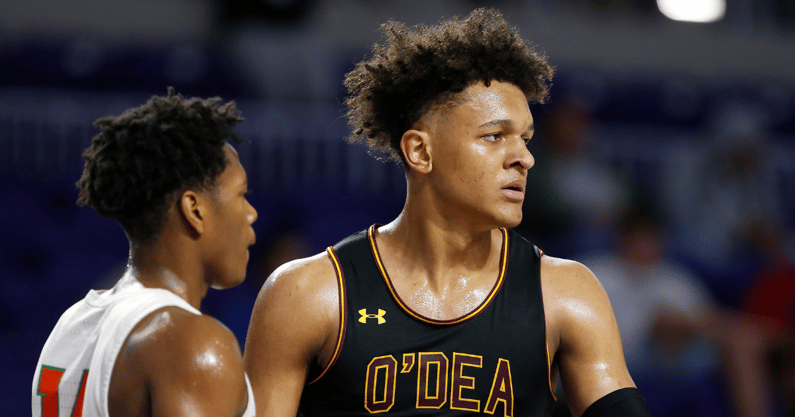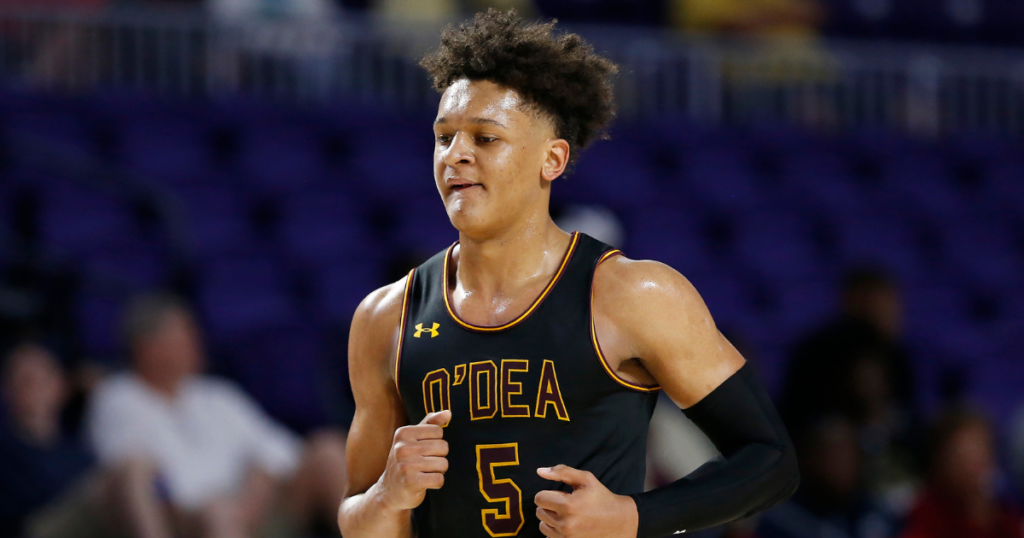Paolo Banchero hasn't even played in a college game, yet already is in NBA 2K22

Most teenagers three months removed from high school graduation are getting settled in an apartment or on a campus and mastering doing laundry. Duke freshman Paolo Banchero just signed a deal to be in a popular video game with pros.
Banchero, a consensus top-five recruit in the 2021 class who hasn’t played in his first college basketball game yet, already is a digital character in the new NBA 2K22 video game. The character purportedly looks and plays just like the 6-foot-10 Banchero, who is expected to be a top pick in the 2022 NBA Draft.
Banchero’s 11-second video announcement to his 91,000-plus Instagram followers on Friday — encouraging fans to check out the new NBA 2K22 video game in which he will be featured — introduces a first-of-its-kind Name, Image and Likeness deal and serves as a noteworthy moment in the young NIL era. It speaks to the soaring popularity—even celebrity status, in rare cases — of top incoming college basketball players; the long-established strength and reach of the Duke basketball brand; and how the array of potential NIL deals is now the No. 1 recruiter in all of college basketball.
It’s also another indicator that we’re still at least two years away from popular college sports video games incorporating thousands of active college players into their product. In the meantime, expect to see more innovative NIL deals like this one, where the most well-known college basketball freshmen receive compensation for allowing digital version of themselves in a video game to match up with LeBron James and Kevin Durant at least a year before NBA rules permit them to do so in real life.
“People are getting creative, and that’s the fun part,” Eric Winston, the former University of Miami offensive lineman and 12-year NFL veteran, told On3 about the NIL space.
Winston is now the Chief Partnerships Officer at OneTeam Partners, which specializes in group licensing and works to maximize the value of athlete NIL across video games, trading cards, apparel and merchandise.
Over the summer, an increasing number of schools launched group licensing deals, including North Carolina, Texas, Ohio State and Alabama; all of those came with the Florida-based The Brandr Group. The focus largely has been on producing jerseys or other apparel that bear the names of the athletes as well as school logos and trademarks.
NIL and video games
But given their popularity the past two decades, the return of college sports video games — enhanced versions that feature active college athletes playing in true-to-life stadiums and arenas — long has loomed as another byproduct of group licensing. They’ve been viewed as a treasure on the horizon, both for the athletes who will be compensated and the legions of fans who adore the games.
Ed O’Bannon’s 2009 antitrust class-action lawsuit against the NCAA, EA Sports and the College Licensing Company resulted in a $40 million settlement. The other outcome of that landmark case was that it became untenable for EA Sports to continue to create its annual college football game using athletes’ images and skill sets. Its last version was NCAA Football 2014.

Times have changed. EA Sports has signaled that the game will be reborn, and North Carolina athletic director Bubba Cunningham told On3 that he expects a video game to include active college athletes in two to three years. And group licensing will be the vehicle that makes this all possible.
“A game like EA Sports college football is going to take a bit (of time) to produce, going to take a bit to bring back,” Winston said. “A Madden game with just Tom Brady isn’t that interesting. A Madden game with just some of the quarterbacks or wide receivers in it isn’t that interesting. What consumers want are the complete rosters, right? They want the team names on the side of the helmets and on the jerseys, and they want the colors to be real.
Top 10
- 1Trending
Pat McAfee
Host talks Mary Kate Cornett lawsuit
- 2
Isaiah Augustave
CU RB not with program
- 3New
Mike Elko
Shreds player over motto
- 4
Jarin Stevenson
Alabama forward to transfer
- 5
Federal Bill to replace NCAA
Conference shakeup, limitless transfers
Get the On3 Top 10 to your inbox every morning
By clicking "Subscribe to Newsletter", I agree to On3's Privacy Notice, Terms, and use of my personal information described therein.
“It’s the same idea here. It’s going to take a bit, but getting that up and moving and us having — especially OneTeam, specifically — the expertise in that video game category to help make that happen, I think, is going to bring it to life a lot sooner.”
Other freshmen in line for same deal?
Until that occurs, expect more announcements like the IG post from Banchero. The concept works for top-ranked incoming college basketball players. To see their digital images in NBA video games isn’t outlandish because the bridge from the high school prom to shaking hands with Adam Silver can be a short one. In fact, if not for the NBA age restriction that has created the beleaguered one-and-done era, at least a few of these elite freshmen would be entering their NBA rookie seasons now anyway.
Don’t be surprised to see Gonzaga’s Chet Holmgren or Memphis’ Jalen Duren strike similar deals long before the freshmen are high picks in June’s NBA Draft. The same applies to another Memphis freshman, Emoni Bates, a household name in basketball circles since middle school who won’t be draft eligible until June 2023.
But the concept doesn’t work with the best incoming college football players. Does anyone have an appetite to see a Madden NFL game featuring Ohio State freshman Quinn Ewers, one of the top high school quarterback prospects of the modern era but a guy who has yet to play in a college game? No, it would border on cartoonish. Fans want more of a college sample size — or at least some sample size — showcasing what football prospects can do other than YouTube footage of Southlake Carroll’s homecoming game.
Would Banchero, 18, who starred at Seattle O’Dea, have been the first college athlete to take part in this type of NIL deal (terms were not disclosed) if he didn’t attend Duke? Perhaps. But it is naïve to think that school affiliation — the program college basketball fans either love or love to hate — didn’t bolster his marketability.
And at a time when the best basketball prospects have attractive options to turn pro and sign six-figure deals with Overtime Elite or the G League, this type of creative NIL deal is just one more potential opportunity that now awaits top talent in college basketball.
“A lot of people thought July 1 was going to come and go, and there’s not going to be legislation and the world was going to end, right?” Winston said. “And I just look back now and say, ‘Hey, man, it came and went, and the world didn’t end.’ Some guys who either their likeness had been getting stolen from them or they hadn’t been getting paid for it are, in some cases, now being paid for it. What’s the issue?”